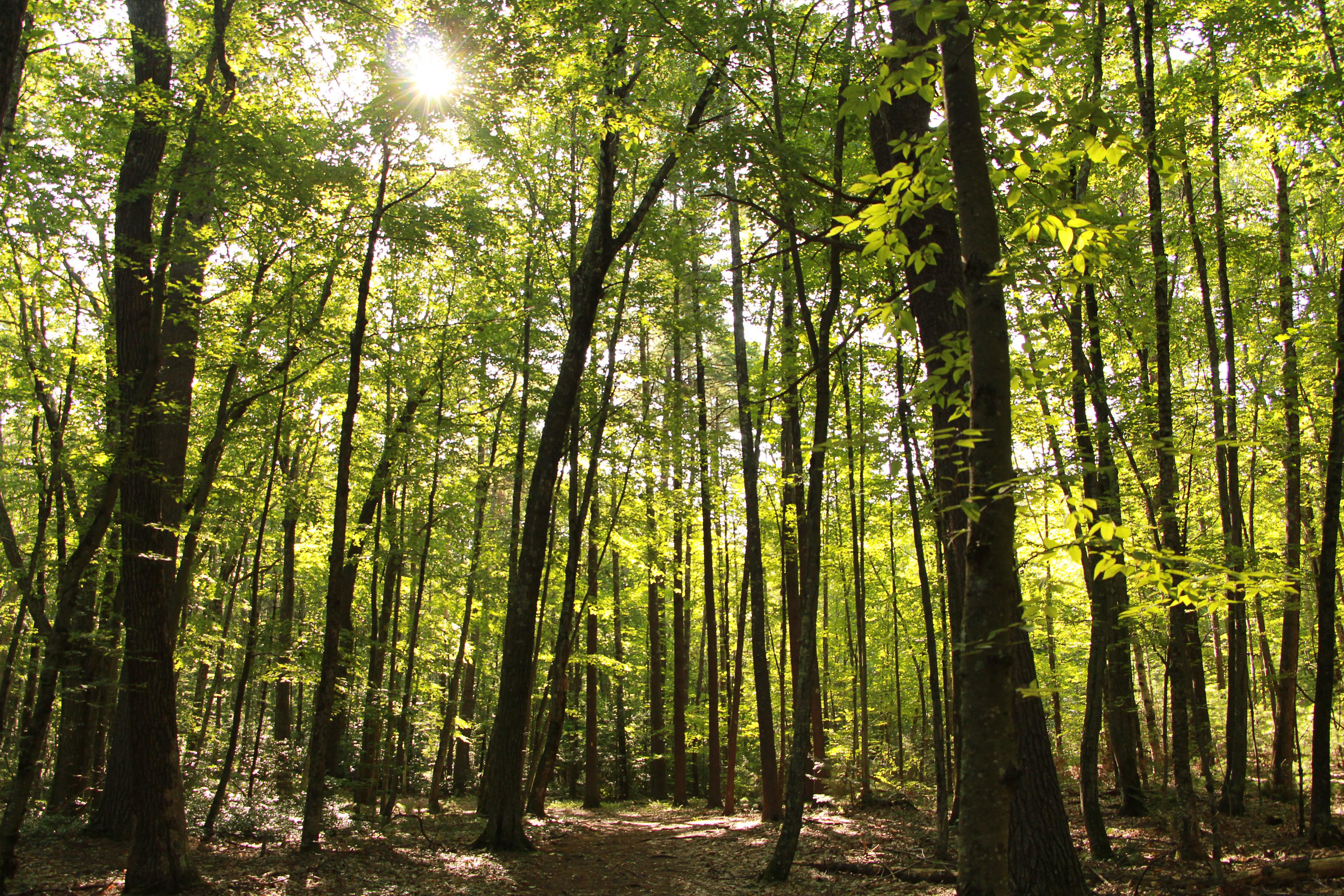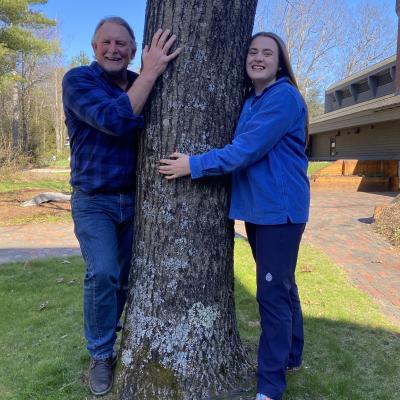
Dave (61)
Happy Earth Day. A former member of our board reached out to me today to wish all of us at the Forest Society a Happy Earth Day. It prompted some reflection on my part about how Earth Day has changed since 1970, when it was first introduced as a nationally observed day.
I remember I had helped to plant ornamental trees on the campus of my elementary school in New Jersey during celebrations of the first Earth Day – April 22, 1970. I was 7 years old. Last time I was in town, I saw the trees had grown tall, my little elementary school more diverse and my surrounding hometown more affluent and suburban without the “woods” we grew up playing in. And though New Jersey has never been truly rural like my chosen home state of New Hampshire, it still seemed a harsh transition from the suburbs that I knew as a child, to the developments that have taken their place.
A question I often ask myself is “If I were able to go back 54 years, what would I have done differently to be more proactive about climate change?” Working in land conservation, that question morphs into “How might we as a society have made choices to better preserve the natural environment and natural resources?”
In the 1970’s, the Clean Air Act and Clean Water Act were established. There was concern for solid waste and Acid Rain. Conserving forests, farms and wetlands via land conservation were NOT widely discussed.
Today, the single largest environmental issue uniting the entire planet is the Climate Crisis…
And yet, we still don’t hear as much – as in decades past – about Human Population Control which was a very common topic in the 1970’s: “The Population Bomb.”
Sometimes, it feels like when we discuss climate change, we approach it as though we have become more clinicians and scientists: our focus being on the technological solutions and perhaps the lack of political consensus to solve complex problems. The social and ethical challenges that have arisen, and will continue to arise, as a result of climate change don’t seem to come to the surface as often.
Perhaps we are uncomfortable confronting our own lives and lifestyles choices, and instead focus on the more largescale issues at hand. Or maybe “Business as Usual” is still almost believable as an option?
Ultimately, I find myself realizing the “next generation” is now in charge – even if they are growing in their political empowerment.
The values and concerns that lead to environmental actions have rightfully shifted to younger generations. I see discussions arising via social media about consumerism and its effects on our climate: the conscious choices about packaging and voting with purchasing dollars – avoiding “plastics” and outlawing “Forever Chemicals” PFOAs in water and soil. Purchasing “Green” goods and services is accessible to a wider segment of Americans – and worldwide.
My generation, the “Baby Boomers” (in NH in particular) had the luxury of decades of access to wild places and yet-rural lifestyles and made choices to protect air, land, water, soil… We enjoyed opportunities to be practitioners of forestry, farming, hands-on land conservation. This feels outside the experience of a majority of increasingly urban, exurban and suburban Americans.
One prominent exception is the focus on alternative energy and electric vehicles and curtailing fossil fuel emissions. But WE are the only solution that exists!
As our understanding of climate change evolves, as our planet changes, as our societies change, so too does the meaning of Earth Day. How will it continue to do so as we move into our future and what steps can we take now to define this observed day and all it represents? I am glad we still can celebrate our tiny planet and increase public understanding of its finite nature and the issue of sustainability.
Sophie (23)
This morning, I forgot it was Earth Day until I walked into my local coffee shop/bakery and noticed their “Cupcake of the Day” featured a perfectly rounded frosting rendition of the Earth. I thought something grumpy about sugar content and the corporatization of climate action and drove to the office, where my beloved colleague featured above greeted me with, “Every day is Earth Day at the Forest Society!”
It's true. When you work in natural resources, no matter the capacity, everyday does feel like Earth Day: each day provides a new opportunity to love and appreciate the world around me, our successes in the realm of land conservation and natural resource preservation feels like a bound towards an invisible finish line, obstacles in that race feel a little larger knowing the context they arise in.
I am the youngest employee at the Forest Society. At 23, I am most of my colleagues’ junior by at least a decade. Sometimes, my youth and subsequent future with the consequences of climate change seems to compound the feeling that we should be treating every day as Earth Day, regardless of whether we work in natural resources or not.
A few months back, I was working on an article that brought me to many parts of the state to meet with several of our 50-year members and talk to them about their histories in land conservation and management, how they first came to be engaged with the Forest Society and what’s kept them around for so long. A question I asked many of them was “What do you wish you had known about land conservation 50 years ago that you know now?”
Resoundingly, their responses had to do with the persistence of climate change and the threats it poses to our wild places.
I’ve had similar conversations with my colleagues, my parents, my grandparents, their peers. During said discussions, when their contributions are about how they wished they had realized the severity of the threat sooner, the bubble over my head commonly reads, “Well, yeah, you dorks. Who would’ve thought that driving cars that got 10 miles to the gallon and building the world out of plastic would one day cause some issues.”
Hindsight is 20/20. In unprecedented times, it’s easy to take the clarity we have now and apply it like a filter to our past. If I were of my parents’ generation, would I have watched the pollution and been able to stand up for what I now know to be right? Or would I have followed the crowd?
I’ve often harbored a sort of dormant rage, directed at no one in particular, but centering around the idea that it’s my generation’s responsibility to right the environmental wrongs of generations past. It seems a colossal burden to bear with little direction or resources to support the weight. But the gravity of our situation is great enough that to put that burden down is out of the question.
Climate action shouldn’t come from rage, or despair, or a sense of impending and unavoidable doom. Like all things, it should come from love. Love for the planet we are failing, the planet who gives so much of itself to sustain our existence, the planet that could take all of it away if we aren’t careful. And love for one another. If you love, you will change.
To my fellow “zoomers:” I love your passion. I love that change seems possible when the mission sprouts from your hands. I love the vision you have for the future that some might label as naivete, but I know to be wholehearted and founded belief. What I would love for us now is to morph that passion into compassion: for one another, but for more importantly those who have come before us, and the framework they have built for us.
To Dave and his fellow “boomers:” I love your wisdom, the reflection that it incites, and the lessons your work has given rise to. I love your willingness to listen, to make the change you know you still can. I love the belief you have in my generation. What I would love now is for that belief to translate into partnership. You say we are the future. For us to reach that potential, we must now stand on your shoulders.
I love the Earth. I love the cherry trees that are in full bloom on my street in Massachusetts, the way they appear to be bowing under the weight of the snowfall we never really saw this winter; I love the way the petals scatter in the wind, freckling the pavement. I love the dandelions in the fields behind my grandmother’s house, the milkweed that replaces them come October, the coyote prints in a dusting of snow that replace those come December. I love rivers during flood season, the sound of high tide, the way sunsets change hues depending on the season. I love the massive sycamores that line the streets in Fenway and Back Bay, the squirrels that hold a monopoly on the lawns of Boston Common, the hyacinths and daffodils waving from window boxes and street gardens in Beacon Hill, proof that even in a city, humanity yearns for nature. I love all that Earth continues to so selflessly give, and I love that we have been allowed so many chances to prove that we still deserve it.

